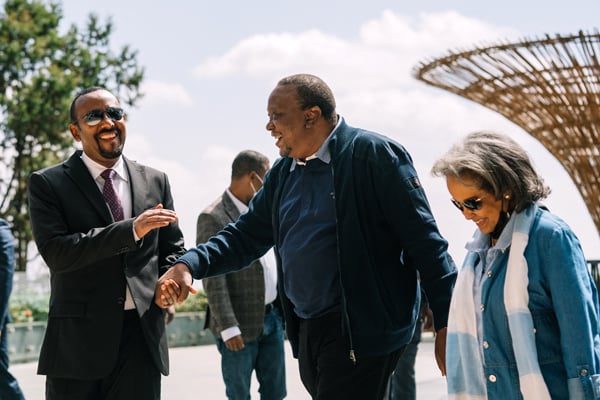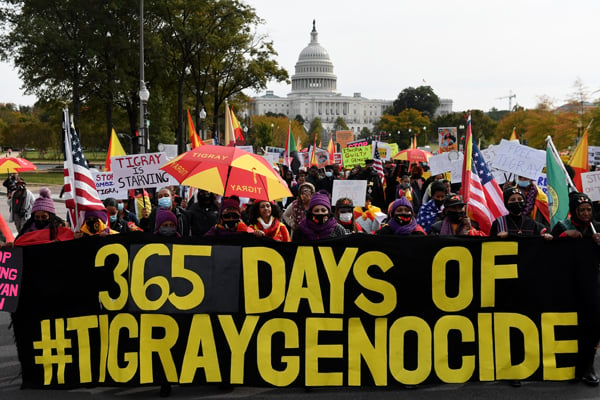Prime
Ethiopia's spiralling war tests fragile region's stability

This hand out photo taken by the Office of the Ethiopian Prime Minister on November 14, 2021 shows Ethiopian President Sahle-Work Zewde (R), Ethiopian Prime Minister Abiy Ahmed (L) and Kenyan President Uhuru Kenyatta (C) at the newly built Entoto Park in Addis Ababa, Ethiopia. PHOTO/ AFP
What you need to know:
- President Uhuru Kenyatta, who has been closely involved in regional mediation efforts and made a surprise visit to Ethiopia on Sunday, has described the war as a "tragic internecine crisis" and urged the parties to lay down their arms.
With thousands of people dead, two million displaced and mounting fears of a rebel march on Addis Ababa, Ethiopia's war threatens to unleash instability across the fragile East African region even as envoys scramble to end the year-long conflict.
US Secretary of State Antony Blinken echoed the worry felt by many when he warned Friday that a failure to strike a deal "would lead to the implosion of Ethiopia and spill over into other countries in the region".
"That would be disastrous for the Ethiopian people and also for countries in the region," said Blinken, who is due to arrive this week in Kenya, one of many neighbouring countries concerned by a refugee crisis sparked by the war.
Tens of thousands of Ethiopians have already fled westward into Sudan, further straining the troubled relationship between the two nations.
Ties hit a new low in August when Khartoum recalled its ambassador to Ethiopia after Abiy's government spurned Sudan's offer to help resolve the conflict.
Although Ethiopia's relationship with Kenya has traditionally been much friendlier, fears of a refugee influx have cast a shadow in Nairobi as well.
Kenya this month announced plans to tighten security along its northern border with Ethiopia, with the police urging locals to report any sightings of undocumented immigrants.
Northern Kenya is already home to two refugee camps that together house more than 400,000 people -- one of the world's largest such settlements.
President Uhuru Kenyatta, who has been closely involved in regional mediation efforts and made a surprise visit to Ethiopia on Sunday, has described the war as a "tragic internecine crisis" and urged the parties to lay down their arms.
"No one can do this for them, no amount of intervention and persuasion will work if they themselves lack the political will to end this crisis," Kenyatta said earlier this month.
Nonetheless, he ordered security agencies to "heighten surveillance" across the country at a National Security Council meeting last week, his office said.
Volatile region
All the warring parties have been accused of atrocities and continued fighting threatens to further destabilise the volatile region if they fail to commit to a negotiated settlement.
The list includes Ethiopian soldiers, the Tigray People's Liberation Front (TPLF) rebel group, Amhara militias and forces from neighbouring Eritrea, which sent troops into Tigray to back Abiy's government after the war erupted last November.
As the conflict has spiralled, leaving mass rapes, massacres and a starvation crisis in its wake, the TPLF -- which dominated Ethiopian politics for three decades before Abiy took power in 2018 -- and its allies have claimed significant territorial gains and not ruled out marching on Addis Ababa.
Neighbouring Djibouti has been watching the developments closely, after deadly violence in August said to have targeted the Afar community -- whose people straddle the tiny country's borders with Ethiopia and Eritrea.
Djibouti's Prime Minister Abdoulkader Mohamed Kamil travelled to the border region earlier this month to meet Afar residents and defuse any discontent that could lead to fresh violence.
'Domino effect'
The African Union (AU), which is headquartered in Addis Ababa, has made a renewed effort in recent weeks to bring an end to Ethiopia's conflict, with former Nigerian president Olusegun Obasanjo leading the push.
But the war has distracted the regional bloc from other pressing priorities, said Hassan Khannenje, director of The Horn International Institute for Strategic Studies, a think-tank based in Nairobi.
"The conflict in the Horn is affecting the ability of regional organisations to focus on other important aspects such as security," Khannenje told AFP.
"There is very little focus on the threat posed by terrorist organisations such as Al-Shabaab and it has afforded some recruitment and radicalisation all the way from Congo to Cabo Delgado (in Mozambique)."
Ethiopia's decision to withdraw some peacekeeping units from Somalia so they could join the war effort has already raised the security risk in the Horn's most fragile state, he added.
If the rebels force Abiy out, the long-term implications could be even more dangerous, he said, warning of "a domino effect" that could see other groups trying to overthrow governments across the region.
Although Obasanjo has urged optimism, describing a small "window" for progress, Khannenje said such "efforts have started a little bit too late".
"To what extent it is going to achieve the desired results remains a question to be answered."





